1:30min
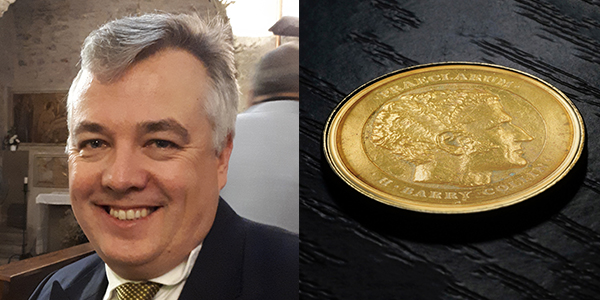
By Helen Carter
Journalist
Adelaide optometrist Professor Konrad Pesudovs is the 14th recipient of the prestigious H Barry Collin Research Medal for his outstanding contributions to knowledge in optics, vision science and clinical optometry.
Optometry Australia today announced that Professor Pesudovs is the 2020 recipient of the medal due to his distinguished career in research. During decades as a clinician/scientist his research has attracted more than $9.3 million in grants internationally and nationally, including repeated NHMRC funding, to improve eye care.
He has published over 300 peer-reviewed research papers which have been cited more than 40,000 times, according to Web of Science. He has written eight book chapters and made more than 200 presentations at international conferences.
‘I believe that clinical care, research and education have been essentially linked throughout my career which has enabled me to at least have a little impact,’ Professor Pesudovs told Optometry Australia.
‘I’m probably best known for my work on understanding the patients’ perspective. When I started there was little science involved in asking patients their view of outcomes; despite what the patient thinks being the most important possible outcome!’
The medal is named after Professor H Barry Collin, long-serving former Editor-in-Chief of Optometry Australia’s journal, Clinical and Experimental Optometry and includes a $5,000 prize and the recipient submitting a paper for publication in CXO.
The award recognises outstanding contributions to the advancement of knowledge in optics, vision science or clinical optometry by a person who is an Australian citizen or a graduate of an Australian optometry school, or who has done a significant part of his or her research in an Australian institution.
Greatest names in optometry
‘My thoughts on receiving the award are equal measures of pleasure and shock,’ Professor Pesudovs said. ‘I’m awestruck by the idea of my name joining a list that has the greatest names in optometry on it, many of whom have been my heroes and mentors: Collin, Westheimer, Adams etc.’
Konrad’s main research interest is ophthalmic outcomes research incorporating optical, visual and patient-centred measurement into the holistic measurement of outcomes of eye care. A key element is the development of patient-centred measures including visual disability, quality of life and other latent traits using Rasch analysis.
He has developed new instruments for the measurement of visual disability and visual symptoms in cataract, quality of life in refractive correction, and visual disability and symptoms in keratoconus and corneal transplantation. He has also improved existing instruments for cataract, glaucoma, macular degeneration, low vision care, dry eye and pain. A comprehensive ophthalmic quality of life measurement system is under development.
Professor Pesudovs is named on three patents from his time in Houston with Professor Ray Applegate for a method of filtering data for the objective classification of eyes, a method for designing and manufacturing custom optics and a method and algorithm for designing custom optics.
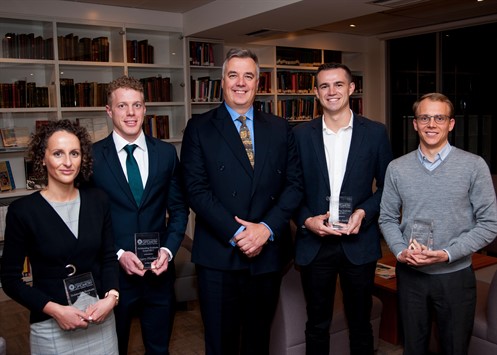
Australian College of Optometry president Professor Konrad Pesudovs in June, 2018 with the ACO’s Outstanding University Graduate Award winners Amanda Edgar, Gregory Hindmarsh, Nicholas Stanley and Alex Kaye. Image: ACO
Professor Pesudovs is the Australian College of Optometry President, the SHARP (Strategic Hires and Retention Pathway) Professor of Optometry and Vision Science, UNSW, and Visiting Research Fellow, Vision and Eye Research Institute, Anglia Ruskin University, UK.
A University of Melbourne optometry graduate, he has received many academic awards including the Hewett award, the Garland Clay award, the Waring Medal and International Optometrist of the Year. He has had a multitude of clinical appointments and editorial journal duties, served on numerous committees, supervised many PhD and post-doctoral students and was a former vice-president of Optometrists Association Australia SA division.
Barry Collin paved the way in ophthalmic research
‘I’m terribly grateful for this recognition and the support of the people who made the selection. This award is particularly important for the position Barry Collin has occupied for me,’ Professor Pesudovs said. ‘When I started my research training in ophthalmology, I discovered that the work of Barry Collin was well known and widely respected in the ophthalmology community.
‘This medal was struck to recognise Barry Collin’s research and the respect that it brought to optometry so it was clear to me at the outset of my research career that Barry Collin had paved the way in ophthalmic research that made it possible for me to have an opportunity also.
‘I’d like to think that I have lived up to his example at least a little, and brought respect to optometry particularly in the ophthalmology community.
Research the pathway to clinical challenges
‘It always seemed natural to me that research was the pathway to finding answers to clinical challenges. I spent my first two years in contact lens specialty practice with Tony Phillips in an era when disposable lenses were proliferating in the marketplace.
‘Not knowing which lens was best I convinced Tony we should do a clinical comparative study, which we did, and we made some useful findings to guide lens selection. This model of taking a clinical problem to a research project and translating back to practice again was reinforced when I joined the Department of Ophthalmology at Flinders University.
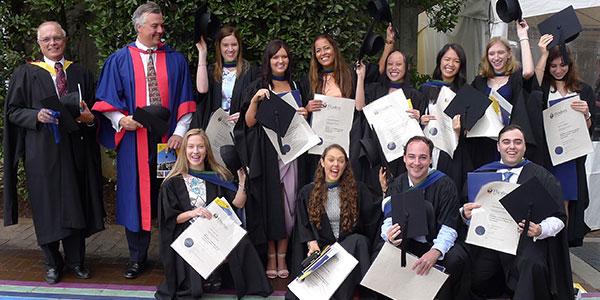
Tony Phillips, left, with Konrad and the first Flinders graduates in a fun photo
‘I noticed that the doctors seeing patients were the same doctors doing research and teaching the trainees. It was here I heard the term clinician/scientist which sounded a good fit for me.
‘Under the guidance of Professor Doug Coster, my research challenge was to try to understand what drove patient satisfaction after cataract surgery. This meant I needed to develop expertise in optical outcomes, visual outcomes and patient-reported outcomes.
‘This gave me a broad grounding in skills and knowledge to develop a career. More importantly, doing a PhD in an ophthalmology department in a school of medicine endowed me with attitudes that have enabled me to have some success: I was told to tackle the most important problem that I could identify; to do clinical work because without the clinical connection I wouldn’t be able to understand the most important problem; if I hadn’t published it, I hadn’t done it.
‘I was expected to win NHMRC funding and to present my research at the most important conferences worldwide and pay my own way. That was a tough school but it gave me the skills to do what I wanted to do; identify and answer important clinical questions.
Clinical work, research and teaching inter-connected
‘I’m often bemused by optometrists who view clinical work, research and teaching as separate entities. To me they are essentially connected and equally important.
‘It’s great to be a clinician because you can help people, albeit one at a time. It’s better to teach because then you help a number of optometrists to help a lot of people. It’s even better to do research, because if you do something really impactful then you can help everyone.
‘Building from my PhD work in cataract surgery outcomes, I’m fundamentally interested in measuring the outcome of ophthalmic interventions. This is complex involving optics, vision and the person’s point of view.
‘Each of these aspects of outcome are complex as are their interactions. I’ve spent time trying to improve the way we measure optical outcomes, a lot of time trying to understand the ways different diseases affect vision differently, but I’m probably best known for my work on understanding the patients’ perspective.
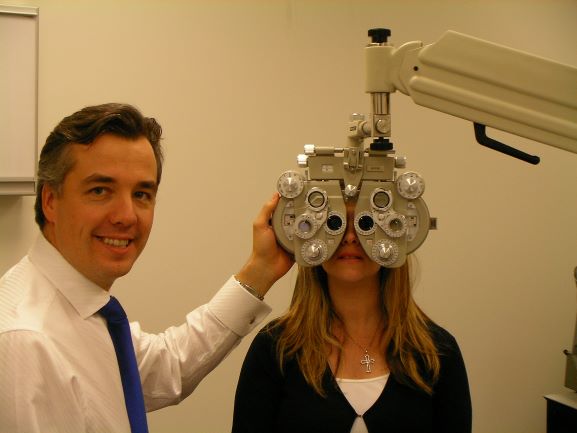
‘When I started there was little science involved in asking patients their view of outcomes; despite this being the most important possible outcome! One of the biggest steps forward we made was to apply mathematical models to questionnaire data to create interval measurement of patient responses.
‘This approach has enabled high quality of measurement of the patients’ perspective. I first did this for the measurement of the Quality of life Impact of Refractive Correction with the QIRC questionnaire.
‘This enabled demonstration of how refractive surgery improves quality of life; a finding which brought great attention from the international refractive surgery community. I’ve applied the same approach to measuring patient reported outcomes for cataract surgery, corneal transplantation, low vision care, treatment of macular diseases etc.
‘High quality measurement of patient-reported outcomes allows testing of treatments and comparisons of treatments to determine what works best. The questionnaires I have developed and modified have been used in numerous studies worldwide.
‘I remain a big believer in the importance of disease-specific content in patient-reported measures and have conducted a series of studies detailing how different diseases impact the person. This work is a stepping stone to more sophisticated patient-reported outcome measures which use algorithms to target questions to the individual.
‘I’ve been very fortunate to get to the point where I get invited to be involved in major international projects like the International Consortium for Health Outcome Measurement (ICHOM) and the Global Burden of Disease (GBD).
‘I’m particularly proud of the work I have done with the GBD which has been immensely time consuming but has produced great documentation of global ophthalmic epidemiology.’
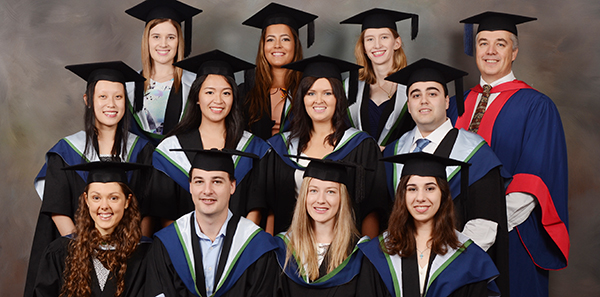
Professor Pesudovs with Flinders first optometry graduates. Photo, Flinders University
Pioneered Flinders problem-based learning optometry program
Professor Pesudovs had a unique career path, developing clinical expertise in contact lens practice, low vision and ophthalmology by combining clinical experience and university education in each sub-specialty area. This facilitated his research, but also prepared him for the opportunity to create an optometry school.
‘Flinders was a great place to do that because I had available to me the expertise in medical education that pioneered the problem-based learning medical program. I believed optometry deserved to have a program that had all the educational quality of a medical course, so that is what I created,’ he said.
‘The course was completely innovative being designed entirely around the patient encounter from case-based learning to the first program to deliver high volume clinical exposure in external clinical settings.
‘The emphasis on communication skills, critical thinking and evidence-based practice produced some remarkably good graduates. I’m very proud of this.
‘I also remember fondly many exciting research projects and breakthrough moments. Similarly, I remember fondly some patient encounters where I thought I did a good job. But most importantly, I believe that clinical care, research and education have been essentially linked throughout my career which has enabled me to at least have a little impact.
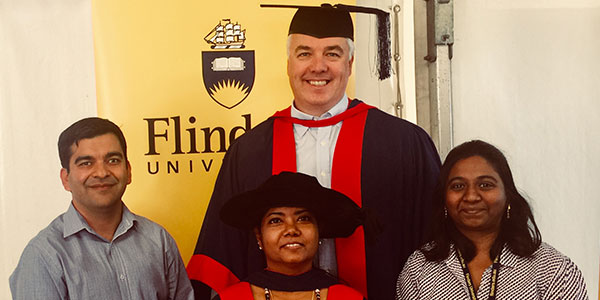
Konrad with L-R Himal Kandel, Mallika Prem Senthil and Sheela Kumaran at Mallika’s graduation
‘Things move quickly in research; the world moves past any specific achievements too quickly for there to be much legacy. The only real legacy is the people that one trains. I’m very fortunate to have had a few extremely good post-doctoral and PhD students who have forged their own careers as academics, clinical scientists or in industry.
‘My three most recent graduates Mallika Prem Senthil, Himal Kandel and Sheela Kumaran are exceptional people who will do great things.
‘The optometry course I created at Flinders provided the opportunity for students who wanted to be good to really excel; a number of whom are developing interesting careers and I hope will provide leadership for optometry into the future.’
The H Barry Collin Research Medal
Emeritus Professor H Barry Collin AM, a distinguished optometrist, academic and researcher, became editor of Clinical and Experimental Optometry in 1993 and retired as Editor-in-Chief 24 years later in 2018 aged 85.
He was an academic teacher and researcher at the University of Melbourne, Head of the School of Optometry at UNSW and is Professor Emeritus at UNSW and a Professorial Fellow at the University of Melbourne.
Professor Collin had a distinguished career, published more than 130 papers in peer-reviewed journals, held appointments at universities overseas, and was awarded many prestigious prizes and awards.
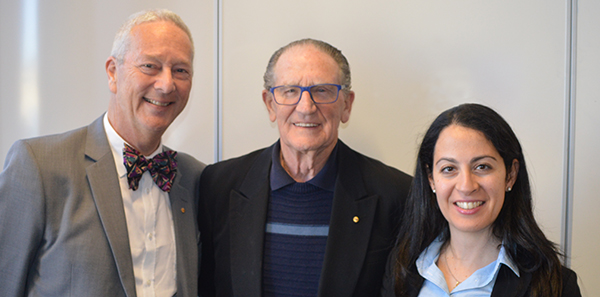
(L-R) Clinical and Experimental Optometry’s Editor Emeritus Professor Nathan Efron, former Editor Emeritus Professor Barry Collin and Deputy Editor Dr Maria Markoulli
Collin medal recipients
H Barry Collin AM, 1977
Brien A Holden OAM, 1988
Gerald Westheimer AM, 2009
John D Pettigrew, 2010
Anthony J Adams, 2011
Donald E Mitchell, 2012
Robert Hess, 2013
David Atchison, 2014
Nathan Efron AC, 2015
Shaun Collin, 2016
Mark Willcox, 2017
Fiona Stapleton, 2018
Erica Fletcher, 2019
Konrad Pesudovs, 2020
All past original research papers are freely available to read in the H Barry Collin Research Medal Virtual Issue on the Wiley Online Library.
Tagged as: Awards - honours - grants-bursaries, Cataracts, Clinical & Experimental Optometry (CXO), Universities